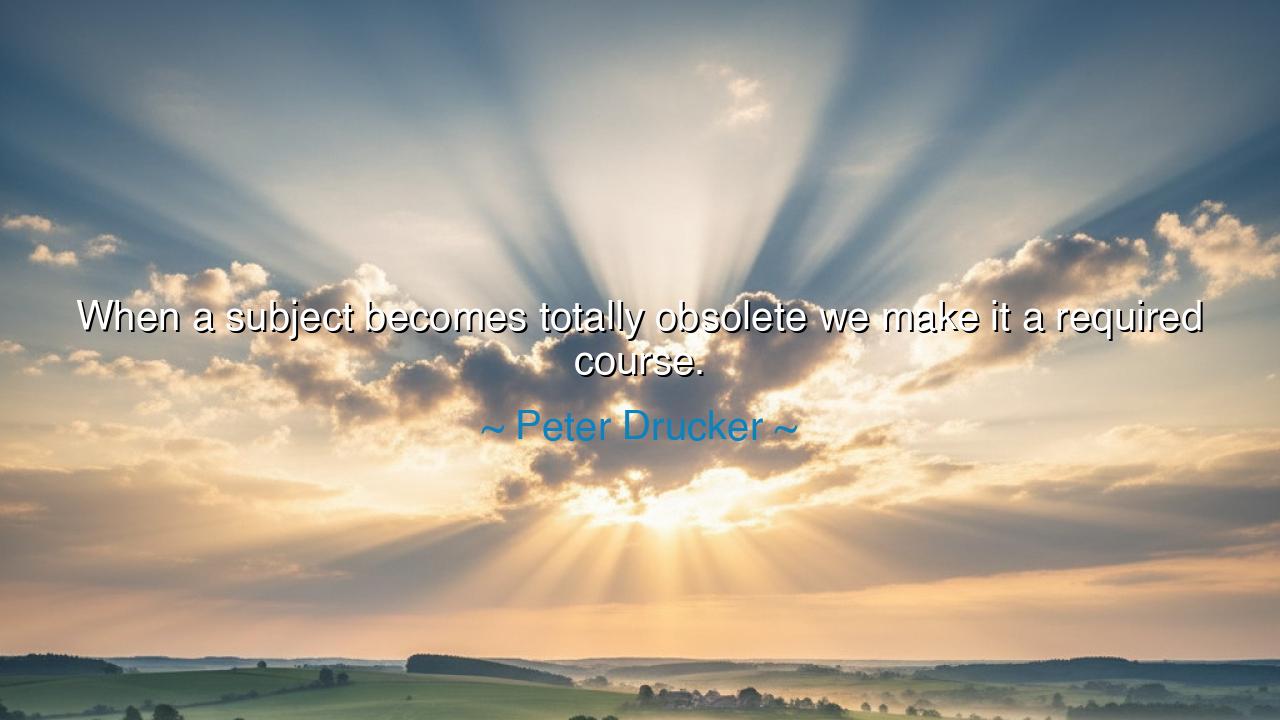
When a subject becomes totally obsolete we make it a required






“When a subject becomes totally obsolete we make it a required course.” Thus spoke Peter Drucker, the great sage of management, a man whose words cut through the pretense of institutions and revealed their hidden follies. His saying is not a jest only, though it carries the sting of humor; it is a lament, a rebuke, and a warning. For it speaks to the slowness of human systems, to the stubbornness of tradition, and to the tragic tendency of schools and organizations to cling to what is dead rather than embrace what is living.
The meaning of Drucker’s words is this: education, which ought to be a flame that lights the path into the future, too often becomes a museum of ashes. Instead of preparing minds for the challenges of tomorrow, schools enshrine the knowledge of yesterday, even when it has lost its power. They do not cast aside the broken tools, but polish them and pass them along, forcing generations to carry burdens that no longer serve. In this way, what is obsolete is preserved with honor, while what is urgent and new is ignored.
The ancients themselves saw this tendency. In the last days of the Byzantine Empire, when enemies gathered at their gates, scholars in the capital quarreled endlessly about trivial theological debates. They argued over angels while the city walls crumbled. This is the very spirit of Drucker’s rebuke: when urgency calls for new learning, institutions turn instead to the safety of old arguments, making the obsolete not only present, but required.
History offers us another vivid example in the story of the French military before World War II. Their academies drilled officers endlessly in the strategies of trench warfare, the lessons of the Great War. Yet when the German armies struck with tanks and lightning war, the old knowledge proved useless. They had made the obsolete—the static defenses of the Maginot Line—a required course, and for this clinging to dead wisdom, they paid in defeat.
Drucker’s words are thus a call to vigilance. He reminds us that true education must be living, ever-renewing, turning its face to the horizon of tomorrow rather than clinging to the dust of the past. It must be humble enough to discard what no longer serves, and bold enough to embrace what is new, untested, and even uncomfortable. Without this courage, institutions risk raising generations unprepared for the world they will inherit.
The lesson for us is sharp: beware of honoring tradition for tradition’s sake. Ask always: does this knowledge serve life? Does it prepare us for the challenges we now face? If not, then let it be taught as history, not as living truth. Parents, encourage your children to question, not only to memorize. Teachers, be brave enough to discard the useless, even if it is enshrined in curricula. Students, do not accept blindly every “required” course as wisdom, but weigh it, discern it, and seek the knowledge that will help you shape the future.
So let Drucker’s words echo as both satire and scripture: “When a subject becomes totally obsolete we make it a required course.” Laugh at the irony, but do not dismiss the warning. For if we cling to the obsolete, we will stumble when the new world dawns. But if we are wise, if we keep our minds supple and our schools alive, then education will not be a tomb, but a flame—guiding us not backward into dust, but forward into light.






AAdministratorAdministrator
Welcome, honored guests. Please leave a comment, we will respond soon